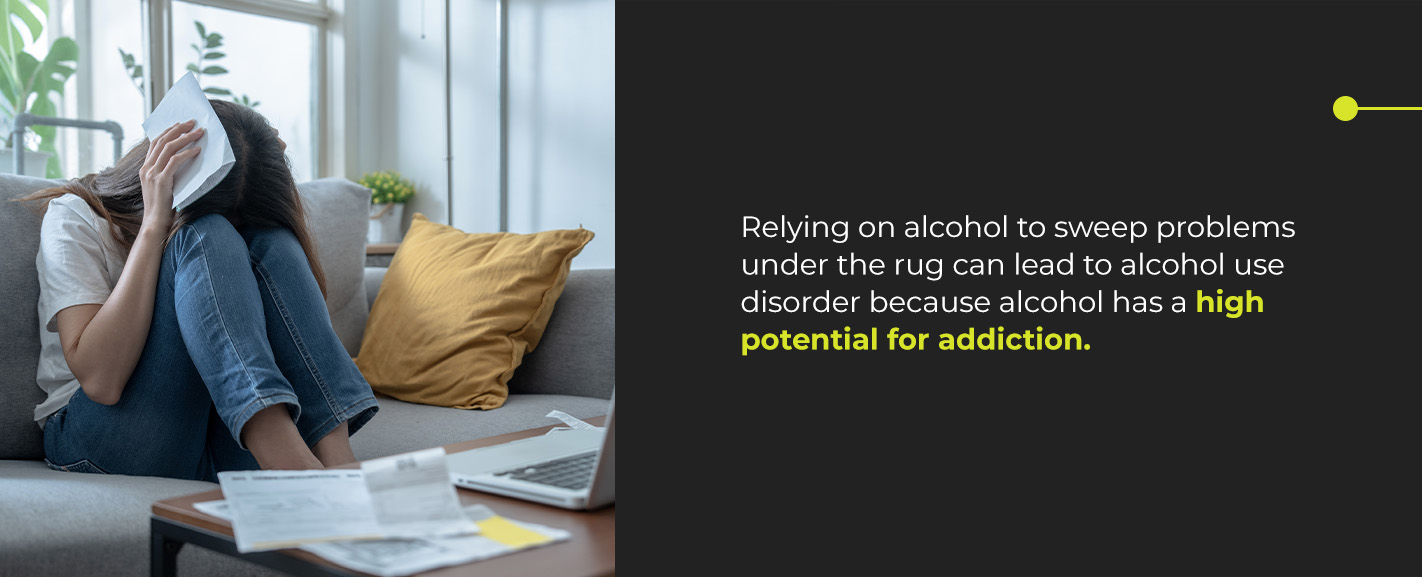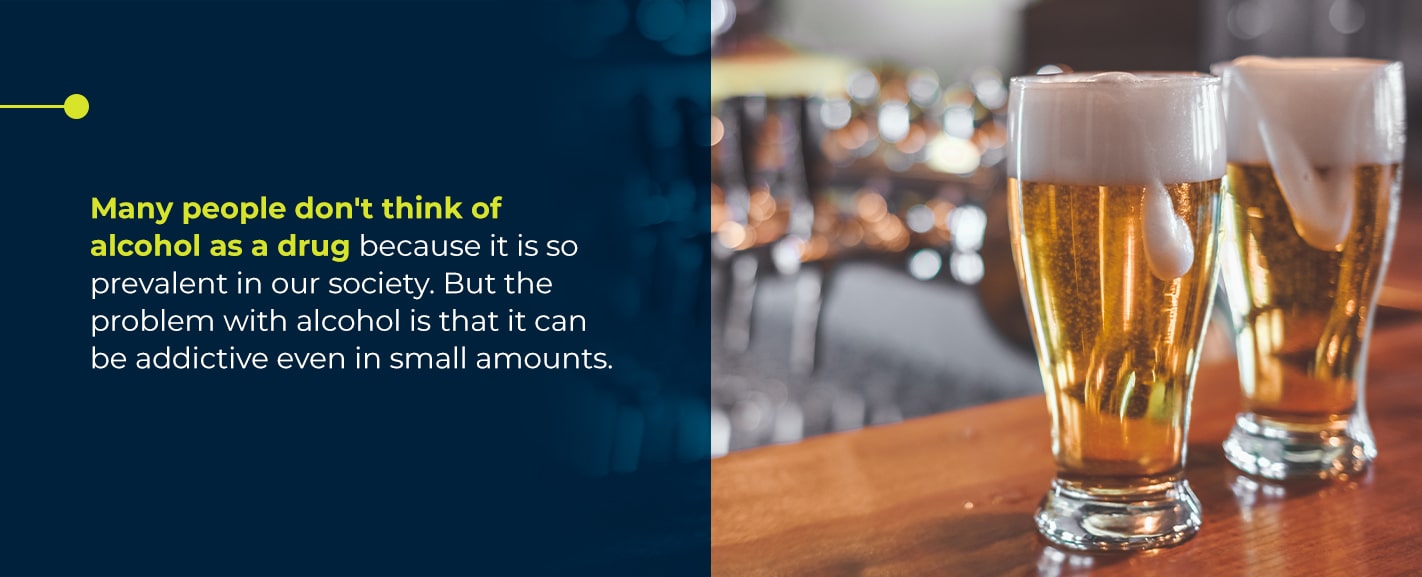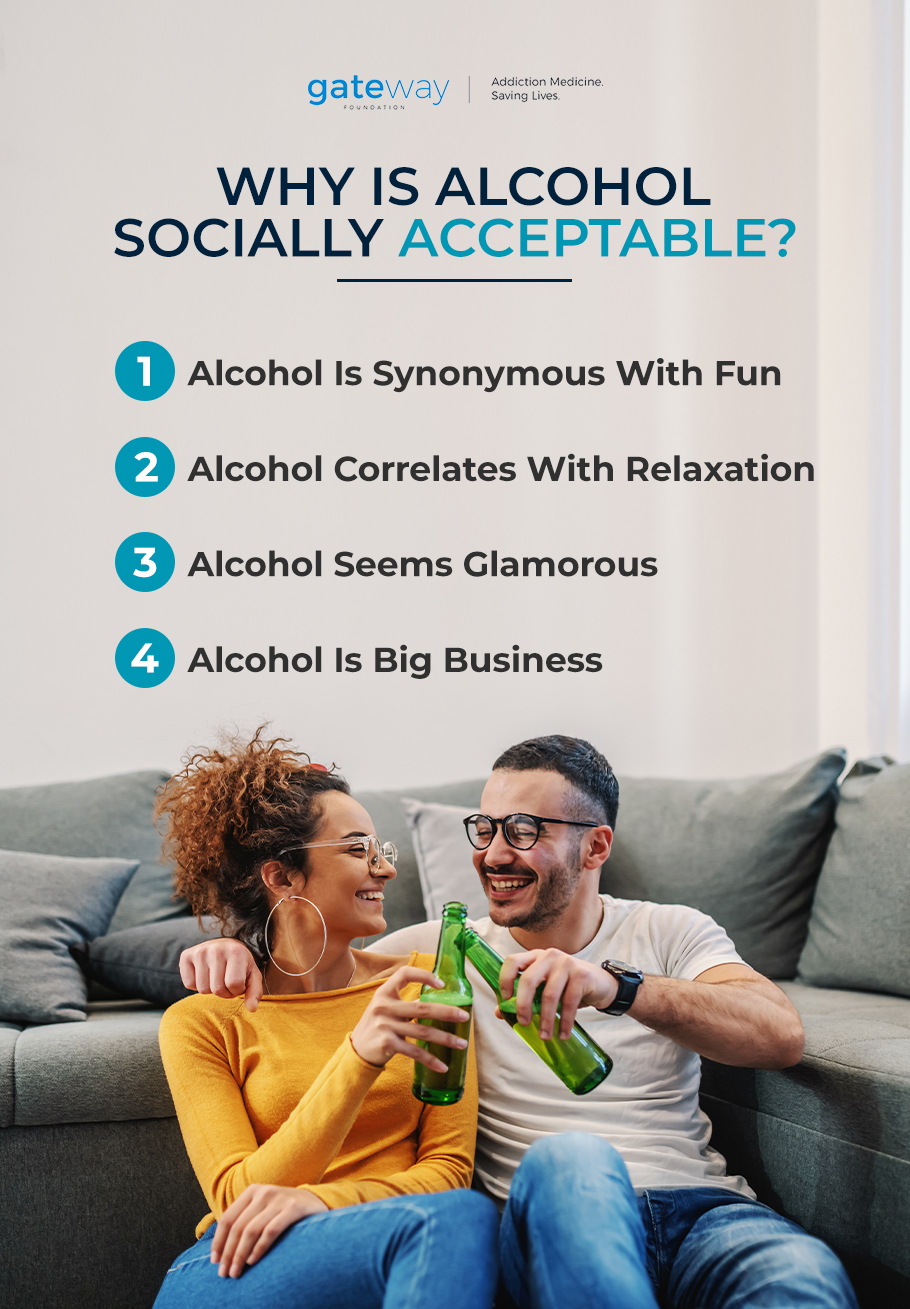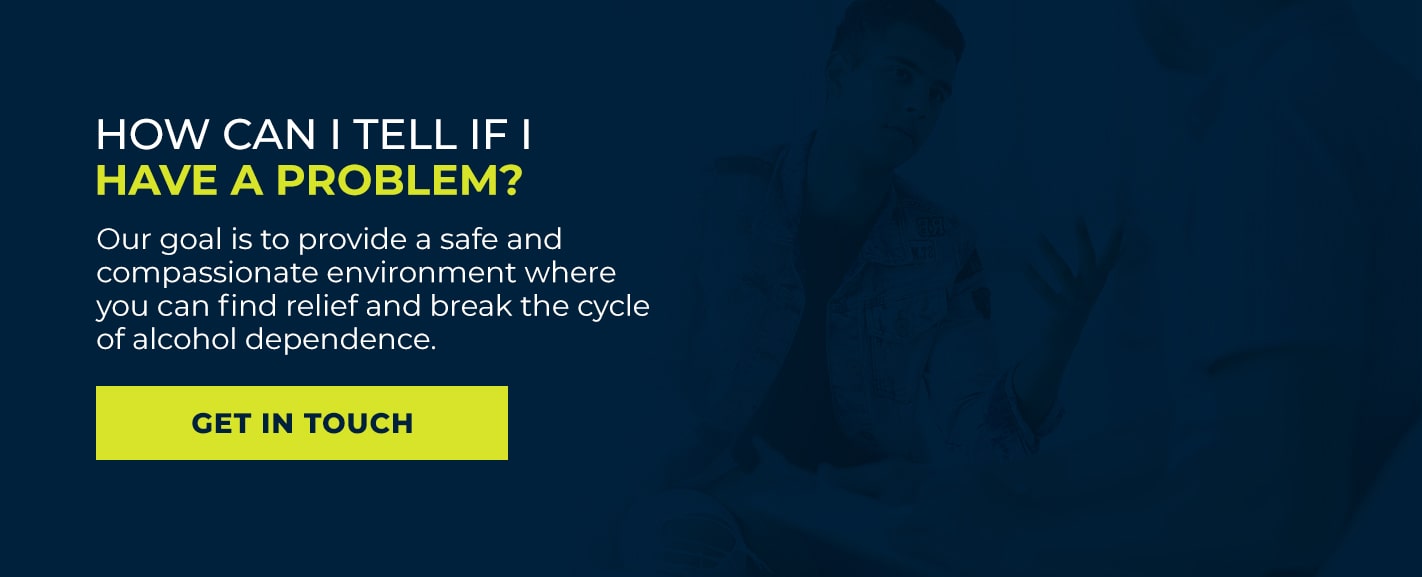- Oct 13
- AddictionAlcohol Addiction TreatmentDrug Addiction Treatment
It’s rare to visit a restaurant or attend a party without seeing people drinking beer, wine or liquor. People use it to kick back and relax after work or on the weekends and, for many, it’s a go-to solution to feelings of anger, depression or grief.
Unfortunately, this all-too-common substance is also one of the most addictive. If alcohol is so dangerous, why does it have such an ingrained association with relaxation and celebrations?
Alcohol is legal and easy to obtain for many reasons. Its frequent link with birthdays, sporting events and other occasions has made it a mainstay in popular culture. But this prevalence has also created staggering effects of alcohol on society. In 2019,14.5 million Americans over age 12had an alcohol use disorder, which is the medical term for someone who can’t stop themselves from drinking dangerous amounts and has become physically dependent on alcohol to make it through their day.
There are many societal effects of alcohol. But understanding what it does to your mind and body and how you can stop the cycle of alcohol abuse is a crucial step toward reclaiming your life and moving forward.
- Alcohol’s Impact on the Human Body
- Is Alcohol a Drug?
- Why Is Alcohol Legal, but Not Other Drugs?
- Why Is Alcohol Socially Acceptable?
- 1. Alcohol Is Synonymous With Fun
- 2. Alcohol Correlates With Relaxation
- 3. Alcohol Seems Glamorous
- 4. Alcohol Is Big Business
- How Can I Tell If I Have a Problem?
Alcohol’s Impact on the Human Body
Alcohol is a sedative. It slows your heart rate and changes the way your brain processes things. After a drink or two, racing thoughts seem to slow down and, in many cases, you may feel calm. However, these feelings are temporary, and they can come flooding back when the alcohol begins to leave your body. This cycle may encourage people to continue drinking to avoid their problems, especially if they struggle with depression, anxiety or grief. Over time, you may also find that it takes more and more alcohol to numb those feelings, prompting you to drink more. Relying on alcohol to sweep problems under the rug can lead to alcohol use disorder because alcohol has a high potential for addiction.
Sometimes, alcohol addiction isn’t about numbing the pain. Often, adults and teens find they develop an AUD after cultivating a dangerous habit of social drinking for fun or with friends. Social drinking is a loosely defined term that can easily lead to consuming too much alcohol or drinking too often. Frequently consuming large amounts of alcohol can also cause the human body to stop functioning as it should and increases your risk of several severe health conditions, including high blood pressure, diabetes and specific types of cancer.
Is Alcohol a Drug?
Alcohol and socializing have gone hand in hand for centuries — so much so that it’s easy to forget alcohol is a drug. Alcohol is a depressant, meaning it slows down the body’s vital functions. That’s why intoxicated people may slur their speech, stumble when they walk or react slowly to what is happening around them. It’s also why people who have been drinking struggle to think rationally or demonstrate sound judgment.
Many people don’t think of alcohol as a drug because it is so prevalent in our society. But the problem with alcohol is that it can be addictive even in small amounts. Various alcoholic drinks have different alcohol content, so a cup of one alcoholic beverage may have more alcohol than another. This variation can make it challenging to judge how much someone has had to drink.
Many people don’t realize alcohol is one of the world’s most addictive and dangerous substances. Why? Alcohol abuse links to more than 60 diseases, and abuse of this substance is more likely to adversely impact others besides the person using it.
Why Is Alcohol Legal, but Not Other Drugs?
According to the National Institute on Alcohol Abuse and Alcoholism, nearly 86% of adults in the United States have consumed alcohol at least once in their lives. Almost 55% have had alcohol at some point in the last month. In short, alcohol is legal because it is so popular — and always has been. When such a significant portion of the population regularly drinks, the alcohol industry contributes significantly to the U.S. economy, especially by providing jobs for many people.
The problem with all these reasons is that easy access to alcohol fuels opportunities for AUD. When it’s socially acceptable and readily available, it’s harder to comprehend that alcohol is a drug, and consumption of it can lead to some very significant, dangerous consequences.
Why Is Alcohol Socially Acceptable?
Alcohol is legal, but that doesn’t mean it’s safe. Think about it this way — your dentist can legally take out wisdom teeth. But you don’t see people lining up around the block to have it done for fun. So what makes consuming alcohol so appealing?
1. Alcohol Is Synonymous With Fun
Many children grow up watching their parents and other grownups drink at family gatherings. As adults, they can’t imagine going to a party, backyard barbecue or the beach without a drink in their hand. Alcohol and fun go hand in hand so often that it’s given rise to the term “social drinking.”
Unfortunately, there’s no official definition of what social drinking entails, which means some people come to believe it’s acceptable to drink every night of the week if they’re at a party or having fun with others. Other people may struggle to limit their consumption because they tend to binge drink in the company of friends.
Social drinking is also dangerous because it can lead to the misconception that people don’t have a drinking problem if they only drink on social occasions. However, your body can’t distinguish when or where you consume alcohol. Even if it starts with a few glasses of wine at dinner, the human body can easily come to expect — and depend on — more frequent consumption to continue to function correctly. Over time, you may find yourself searching for excuses to celebrate or beginning to drink more outside these other events because your body craves alcohol.
2. Alcohol Correlates With Relaxation
Because alcohol is a depressant, it’s long been a quick way to relieve anxiety in social situations. Many people drink before a stressful event to loosen up and enjoy themselves. Some view it as a way to unwind after a challenging day at work.
In theory, this is true. Alcohol slows your heart rate and your thought process. Initially, you’ll feel a mental and physical release of tension. When you’re dealing with a stressful situation or have had a difficult day, this can be a welcome change. But this feeling won’t last. And the more you use alcohol to help your body slow down, the more you’ll have to consume to achieve that same effect over time.
Alcohol use also covers up problems that can worsen in severity if left untreated. For example, you may have a glass of wine to ease anxiety symptoms. However, even if it makes you feel better temporarily, it doesn’t solve the problems you’re experiencing. When the alcohol’s effects wear off, the anxiety and its cause are still there. Over time, consuming alcohol can adversely affect your brain function and your physical strength, leaving you less capable of confronting the problems you began with.
3. Alcohol Seems Glamorous
Microbreweries and local winery tours and tastings are all the rage right now. These places tout the appeal of trying different wines and beers and how they make some foods taste better. Pairing food and alcohol isn’t a brand-new concept. Many people unconsciously associate beer with pizza, wine with chocolate or a margarita with Mexican food. Think about all the memes and jokes on social media about it being “five o’clock somewhere” or “Wine Down Wednesday.” How many times have your girlfriends complained they “need a drink” after running around with their kids or an argument with their partner? The idea of alcohol as a quick escape is everywhere.
The truth is, alcohol consumption and addiction aren’t glamorous. In the short term, alcohol consumption increases your risk of:
- Intimate partner violence
- Sexual assault
- Motor vehicle crashes and other accidents
- Miscarriage
- Sexual encounters that lead to STDs or unwanted pregnancy
Over time, alcohol consumption can increase your risk of:
- Cancer
- High blood pressure
- Diabetes, stroke and liver disease
- Mental health problems
- Weakened immune system
- Social problems, including conflict with family members and close friends
- Loss of employment
- Loss of money
- Death
4. Alcohol Is Big Business
You don’t have to look far to see a billboard encouraging you to enjoy a cold, refreshing beer or a frosty margarita. And all this advertising has paid off big time for alcohol manufacturers and distributors. These industries continue to grow and flourish, finding new and more creative ways to convince adults of all ages that drinking is a way to keep their lives exciting and fun.
But alcohol consumption and abuse can also cost a lot of money. In 2010, alcohol misuse cost the U.S. $249 billion. Globally, alcohol use is the seventh most common cause of death, with 5.3% of all deaths worldwide linked to alcohol. If that isn’t problematic enough, more than 10% of children in the United States live with a parent who has AUD.
Children living with a parent who abuses alcohol struggle with a range of mental health issues. They may also have trouble in school, display aggression toward their peers and, sadly, are also at risk for displaying various harmful behaviors, such as violence, theft and AUD, as they age. These costs aren’t always something you can calculate in dollar amounts, but they can cost a lot of money for the communities and families who are having trouble coping with these effects and behaviors.
How Can I Tell If I Have a Problem?
Alcohol use is all around us, which is why it can be so challenging to spot a problem before it spirals out of control. But there are ways to tell when social drinking becomes a severe problem.
- Finding more reasons to drink
- Drinking alone
- Drinking while on medication
- Hiding alcohol from others
- Lying about drinking habits
- Binge drinking or consuming larger quantities of alcohol at one time
- Blacking out after drinking
- Stealing alcohol or money to purchase alcohol
- Feeling guilty or ashamed after you’ve consumed alcohol
If you or a loved one are displaying signs of a drinking problem, it’s time to explore your options for treatment.
The best decision you can ever make is to ask for help!
The Gateway Foundation is a recognized leader in addiction medicine. Our goal is to provide a safe and compassionate environment where you can find relief and break the cycle of alcohol dependence. Regardless of what you believe or what you’ve heard, there is hope. And it’s not too late. When you begin a program at Gateway, you will find a team of professionals who are ready to walk the road of recovery with you. We aren’t only here for the withdrawal process — we’re with you every step of the way, no matter how long it takes.
Gateway offers a wide range of cost-efficient, highly effective treatments for patients at every age and stage of recovery, including residential, outpatient, day treatment and aftercare. We also offer a virtual program for adolescents struggling with alcohol or drug addiction.
It’s time to move forward. Contact Gateway today.






